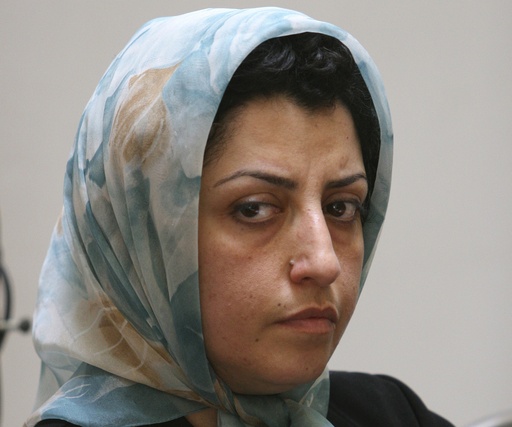DUBAI, United Arab Emirates — Narges Mohammadi, a Nobel Peace Prize winner currently imprisoned in Iran, recently underwent intricate surgery due to concerns of a potential cancerous lesion in her right leg. However, she was promptly sent back to prison after just two days, which raises significant risks to her well-being, according to various human rights organizations.
Over 40 activist groups have collectively signed a letter calling on the United Nations Human Rights Council to demand Mohammadi’s immediate release on a medical furlough. They argue that her imprisonment is unjust, with the charges against her drawing widespread international condemnation. This action is part of a broader push to exert pressure on Iran regarding Mohammadi’s continued detention, which has persisted since the Nobel committee recognized her efforts last year.
In an alarming development, another activist reportedly set himself on fire in prison to protest his incarceration, highlighting the internal strife in Iran that has continued in the wake of longstanding protests against the country’s theocratic regime. The letter, dated Monday, urged Iranian officials to halt the criminalization of human rights and to avoid summoning human rights advocates, journalists, and writers into prison, especially when their health is deteriorating.
The Iranian mission to the United Nations has not provided an immediate response to requests for comments on the situation. Additionally, Iranian state media, which has largely overlooked previous appeals for Mohammadi’s release, has yet to report on this latest letter.
At 52 years old, Mohammadi is serving a total of 13 years and nine months in prison for charges that include collusion against state security and propaganda against the government. Despite being arrested multiple times and enduring extensive periods behind bars, she has remained steadfast in her activism, supporting the nationwide protests led by women triggered by the death of Mahsa Amini in 2022.
The letter noted that she had previously experienced multiple heart attacks while imprisoned and underwent emergency surgery in 2022. Recently, her legal team disclosed that doctors uncovered a bone lesion that might be cancerous, leading to the surgery she had on Thursday. After the procedure, she was returned to prison despite her doctor’s advice to allow for further recovery and her legal team’s request for a medical furlough.
According to the letter, years of incarceration and time spent in solitary confinement have drastically undermined Mohammadi’s health, leaving her with multiple serious medical issues that cannot be adequately managed through a brief hospital visit.
The precarious situation in Iran is compounded by an economy that has suffered severely due to years of Western-imposed sanctions. This has led to widespread public discontent over issues such as currency devaluation and governmental corruption. Protests against these conditions have continued, accompanied by a notable government crackdown on opposition voices. The recent election of Donald Trump has fueled apprehension among many that he may revive tough policies against the Islamic Republic upon taking office in January.
Further apprehension surrounds other imprisoned activists in Iran as well. Recently, Saeid Gharibi reportedly set himself on fire to protest his lengthy 15-year prison sentence and the harsh conditions in Shiraz’s Adelabad Prison. His attorney indicated that Gharibi suffered severe burns and has been denied necessary medical attention, though the Iranian government has yet to acknowledge this incident.
Additionally, a former journalist from the Voice of America’s Farsi service tragically jumped to his death from a Tehran building in protest against the nation’s supreme leader and the ongoing suppression of dissent.


